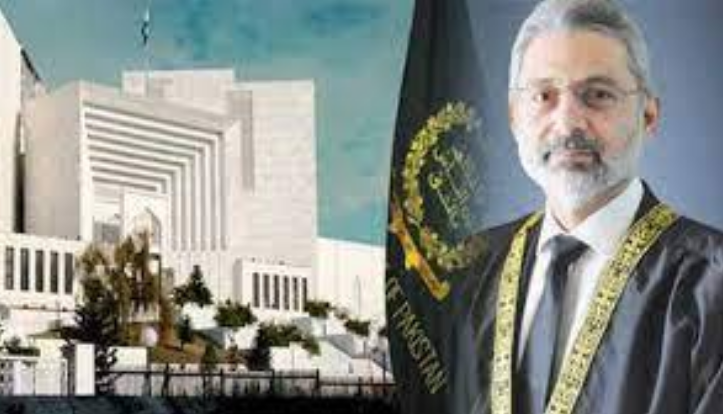Islamabad (Web Desk): The Supreme Court (SC) on Wednesday rejected Pakistan Tehreek-e-Insaf’s (PTI) objections against the bench formed to hear the Article 63-A review petition.
According to details, PTI lawyer Barrister Ali Zafar raised the objection during today’s hearing.
However, Chief Justice of Pakistan (CJP) Qazi Faiz Isa swiftly rejected PTI’s objections as baseless.
In his argument, the PTI lawyer maintained that the bench’s formation did not follow proper legal procedures and that the party had not been notified adequately in advance about the hearing.
Barrister Ali Zafar contended that this lack of notice compromised the fairness of the proceedings and demanded that the bench be reconstituted according to legal norms.
Responding to this, the CJP clarified that the bench's formation was in full compliance with judicial procedures, stating, “We all agreed as a court to reject the objections raised against the bench’s legality.”
CJP Isa remarked that the decision was unanimous among the judges.
Meanwhile, the hearing turned tense when PTI lawyer Tayyab Mustafain Kazmi threatened the court by claiming that hundreds of PTI lawyers were prepared to prevent an unfavourable ruling.
Responding sternly to this, the CJP questioned whether Kazmi expected the country's institutions to be governed by threats.
The CJP added that the bench will continue with these proceedings regardless of the pressure. He made it clear that the judiciary operates independently.
In his remarks Justice Jamal Khan Mandokhail said that that there is a worrying trend of criticising the judiciary when rulings do not favour certain political parties.
“Judges are not here to be influenced by threats or public pressure,” Mandokhail said, underscoring the importance of judicial independence in Pakistan’s democracy.
The top court reaffirmed that the judiciary would not be influenced by external pressures and would continue its work impartially.
Later the court adjourned the hearing till Thursday.
In the previous hearing on Tuesday, the federal government and the Pakistan Peoples Party (PPP) announced to back the Supreme Court Bar Association's (SCBA) review plea against the apex court's May 2022 verdict on Article 63(A).
The review petition, filed by the Supreme Court Bar Association (SCBA), is being heard by a newly formed five-member bench led by Chief Justice Qazi Faez Isa along with Justice Amin-ud-Din Khan, Justice Jamal Khan Mandokhail, Justice Mazhar Alam Khan Miankhel and Justice Naeem Akhtar Afghan.
On Monday the top court adjourned the hearing due to Justice Munib's absence and said that Justice Munib would be requested to rejoin the bench, which otherwise, would be reconstituted.
The CJP addressed the bench formation issue and revealed that Justice Munib retained his stance regarding his presence on the bench.
On the issue of the judges' committee, CJP Isa said that he recommended including Justice Mansoor Ali Shah and that the puisne judge's office was office contacted in this regard.
However, owing to Justice Mansoor's refusal, the CJP said that they were left with no option but to include Justice Afghan in the bench.
In 2022, the SC announced that parliamentarians cannot vote against their party policy, adding that the votes of dissident lawmakers will not be counted.
The top court, issuing its verdict on the presidential reference that sought its interpretation of Article 63-A of the Constitution, which pertains to the disqualification of lawmakers over defection, said that the “article concerned cannot be interpreted alone.”
The decision by the SC was a 3-2 split decision, with a majority of the judges not allowing lawmakers to vote against the party line in four instances outlined under Article 63-A. These four instances are the election of a prime minister and chief minister, a vote of confidence or no-confidence, a Constitution amendment bill, and a money bill.
Later, the Supreme Court Bar Association’s (SCBA) requested the SC to direct all state functionaries to act strictly in accordance with the Constitution and the law, and ask them to restrain from acting in any manner detrimental to and unwarranted by the Constitution.
“The apex court’s opinion about not counting the dissident’s votes is against the Constitution and equal to interference in it,” the SCBA said.
According to Article 63 (A) of the Constitution, a parliamentarian can be disqualified on grounds of defection if he votes or abstains from voting in the House contrary to any direction issued by the parliamentary party to which he belongs, in relation to the election of the prime minister or chief minister, or a vote of confidence or a vote of no-confidence; or a money bill or a Constitution (amendment) bill”
The Article says that the party head has to declare in writing that the MNA concerned has defected but before making the declaration, the party head will provide such member with an opportunity to show cause as to why such declaration may not be made against him.
After giving the member a chance to explain their reasons, the party head will forward the declaration to the speaker, who will forward it to the chief election commissioner (CEC).
The CEC will then have 30 days to confirm the declaration. If confirmed by the CEC, the member “shall cease to be a member of the House and his seat shall become vacant”.


